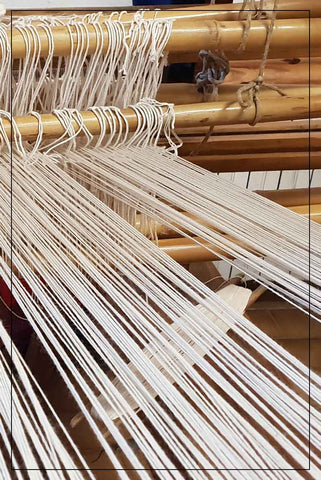In a world increasingly aware of the environmental and social impacts of our consumption choices, preserving traditional crafts and pursuing sustainability in fashion are more crucial than ever. Hand-loomed fabrics, with their rich history and unique craftsmanship, are irreplaceable treasures of our cultural heritage. As conscious consumers, we are responsible for safeguarding these traditions and the planet by making informed choices. This blog post explores the importance of authenticity in hand-loomed textiles and eco-conscious goods, emphasising the need for transparency in the sustainable fashion industry.

Preserving Centuries-Old Craftsmanship
The art of hand-loomed fabrics is a testament to the skill and dedication of artisans who have passed down their knowledge through generations. These textiles are not just materials but storied pieces that embody cultural identity and craftsmanship. The loss of these skills would mean the irrevocable loss of part of our collective history and a diminution of the diversity in the global tapestry of textiles. As consumers, it is imperative to value and support the authentic production of handwoven fabrics by demanding transparency and evidence of the handmade nature of these products.
Navigating the Market with Caution
The allure of handwoven textiles and eco-conscious goods has unfortunately led to the rise of unscrupulous traders looking to capitalize on the growing demand without adhering to ethical practices. This makes it essential for customers to exercise caution and due diligence when purchasing such items. Asking for evidence of a product's handmade origins or information about its sustainable credentials is a right and a necessity in promoting a fair and ethical marketplace.
Understanding the Eco-Conscious Choice
The shift towards eco-conscious sustainable goods is a positive trend towards mitigating the fashion industry's environmental impact. However, truly sustainable consumption requires more than just a label. It demands an understanding of the entire production process, from sourcing materials to the conditions under which goods are produced. By inquiring about these aspects, consumers can make informed decisions that align with their values and support practices that benefit the environment and society.
Combating Greenwashing in the Fashion Industry
The term "greenwashing" has emerged to describe the practice of misleading consumers about the environmental benefits of a product or service. In the context of fashion, this often involves vague or unsubstantiated claims about sustainability. To combat greenwashing, it is vital for consumers to demand clear, verifiable information about the green credentials of the products they purchase. Without this transparency, the conversation around sustainability remains hollow, and the potential for meaningful change is diminished.

The Power of Informed Choices
The preservation of hand-loomed fabrics and the pursuit of genuine sustainability in fashion hinge on our consumers' choices. By prioritising authenticity, demanding evidence of craftsmanship and sustainability, and being vigilant against greenwashing, we can contribute to a more ethical and sustainable fashion industry. Our decisions have the power to support artisans, protect the environment, and ensure that the beauty and diversity of traditional crafts are celebrated and preserved for generations to come.

